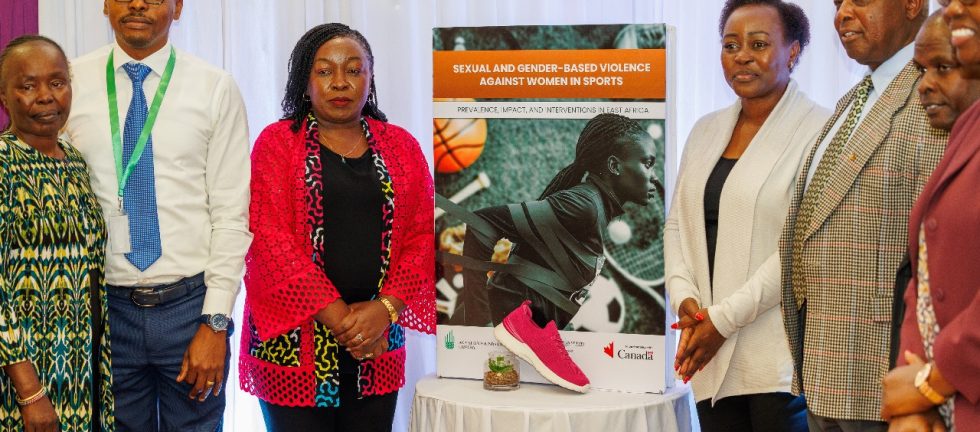East Africa: Sexual, Gender-Based Violence Rife in Sports
By Charity Mbejjewe
A majority of athletes in East Africa have either experienced or witnessed sexual and gender-based violence (SGBV) in sports.
According to a groundbreaking study by The Aga Khan University, more than 60% of them have experienced this. Notably, Kenya records the highest prevalence at nearly 70%.
The report titled ‘Sexual and Gender Based Violence Against Women in Sports (2025)’ by the Graduate School of Media and Communications at The Aga Khan University, conducted across Kenya, Uganda, and Tanzania, found that verbal abuse, sexual harassment, and emotional abuse are the most common forms of violence faced by female athletes. Coaches, teammates, and fans emerged as the primary perpetrators. The research underscored that athletes at professional and competitive levels are most vulnerable due to power imbalances, dependence on coaches, and lack of protective structures.
Speaking during the report launch at the Aga Khan University in Nairobi, Athletics Kenya President and World Athletics Vice President, Lieutenant General (Rtd) Jackson Tuwei, said that the country needs to devise urgent interventions and educate victims on how to identify and report abuse, considering that most perpetrators are people well known to them, and abuse often occurs within family settings where federations may not easily detect it.
“The unfortunate part is that these cases are being dragged. There needs to be a way for the cases to be expedited so that victims receive timely justice. There is also exploitation, where athletes lose their properties to their partners. We have various cases in court regarding this vice. It’s sad because the victims do not realize they are being swindled out of their hard-earned money,” noted Tuwei.
Despite global calls for gender equality in sports, women in East Africa continue to suffer in silence. Tuwei noted that the federation has witnessed several SGBV cases, mourning the untimely deaths of athletes, including Agnes Tirop, who was allegedly murdered by her husband in her matrimonial home in October 2021. A few days later, Edith Muthoni was hacked to death by her spouse.
About six months later, Damaris Muthee Mutua was strangled to death by her Ethiopian boyfriend, who fled the country before the crime was discovered. Ugandan Olympian Rebecca Cheptegei was burned alive by her ex-partner in a property dispute. Abuse has also affected men. Hosea Macharinyang died by suicide in 2021 due to marital issues, while Samson Kandie was murdered in his own home in 2024, where the wife was arrested as a prime suspect by the Kenya Police.
The study noted that emotional abuse, which is often overlooked due to its invisibility, leaves lasting psychological trauma. Verbal abuse was cited in 43% of cases, while 14% reported sexual harassment. The likelihood of abuse increased with years in sports, with many retired female athletes choosing to leave sports entirely due to trauma.
It was also found that fans, coaches, and teammates are the main perpetrators of abuse against female athletes, with fans being the worst at 32%, followed by coaches (23%) and teammates (22%).
Kenya Rugby Union Chairperson Harriet Okatch said that in her federation, where 62% of players admitted to having been verbally abused, efforts are underway to provide players with the psychosocial support they need.
“We have introduced mental health coaches for our players who are independent, to make sure our players have a safe space they can rely on. I do not want this to be just a launch of some research; I want it to be collaborative and affirmative to ensure that our players are safeguarded,” said Okatch.
The report found that the main cause of SGBV in sports is lack of awareness and education, mentioned by 40% of respondents. This was especially high in Kenya (49%) and Tanzania (39%), while only 29% in Uganda cited it.
Another major cause is the power imbalance between coaches and athletes, with 20% of respondents across East Africa identifying it. In Uganda, power struggles (24%) and gender stereotypes (20%) were also significant concerns.
The study also shows that coaches are among the top abusers, with 26% in Tanzania, 23% in Kenya, and 19% in Uganda reporting coaches as perpetrators.
Because coaches control key aspects such as training, team selection, and scholarships, many athletes feel powerless to report abuse, fearing lost opportunities or not being believed.
Many perpetrators hide behind respected public positions in sports, using their authority to quietly exploit athletes while maintaining a professional image.
The report recommended mandatory education, stronger policies to tackle SGBV, safer reporting mechanisms, and the inclusion of women in leadership roles within sports institutions. It also urged East African governments and sports federations to invest in protective infrastructure, equipment, and support systems for athletes.

